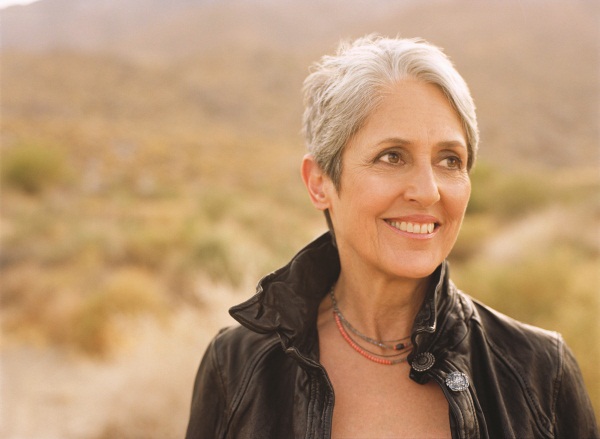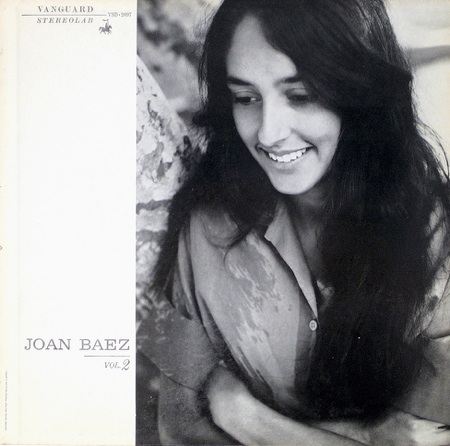Videos by American Songwriter
Joan Baez epitomizes the ideal of the American folk singer. Ever since rising to national prominence in the early ‘60s, she’s stood at the crossroads of music and social protest, adhering firmly to the belief that music can in fact change the world.
Baez cut her teeth as a singer in the Cambridge, Massachusetts folk scene of the late ‘50s, when she was enrolled in college at the Boston University School Of Drama. She was signed to Vanguard Records in 1960, and soon became an international sensation. Early in her career, she met Bob Dylan, who at the time was hailed as the second coming of Woody Guthrie. Baez helped introduce the young Dylan to the world at large, sharing the stage with him and recording his songs.
Throughout her career, Baez has primarily been known as an interpreter of other people’s work. However, many of her own compositions, such as “Diamonds And Rust” and “Here’s To You,” reveal her depth as a lyricist and songwriter.
Even as a septuagenarian, Baez continues to record and tour – and she looks and sounds great. Her last album, Day After Tomorrow, was produced by Steve Earle, and features songs by Elvis Costello, Gillian Welch, Tom Waits and others.
As this story is being written, Baez is set to embark upon a tour of France, followed by another tour with Kris Kristofferson, whom she first met at the Isle of Wight festival years ago. We spoke with the singer about Dylan, songwriting, and the state of American politics.
You’re known primarily for the songs you cover. Was there ever a point when you considered writing more of your material?
I haven’t written for the last 20 years. I think the poetry in my songs is really good. And I think the melodies are really good. And I think the only trick with my songs is that they’re not the kind of songs that people are urged to cover because they’re more personal. I write them more personal; it’s like reading a poetry book.
“Diamonds And Rust,” which is one of your more well-known compositions, fits more into that personal category.
Yeah, and it’s the only one that crossed over from very personal to being acknowledged in a very big way.
Do you remember the process of writing that song? Was that one that came in a burst or did you cultivate it for a while?
Well, it’s funny because I was writing it and it had nothing to do with what it turned out to be [Ed note: It’s widely believed to be about Bob Dylan]. I don’t remember what it is, but I think I was writing a song. It was literally interrupted by a phone call, and it just took another curve and it came out to be what it was.
Your history with Bob Dylan is a significant part of your legacy as an artist, which I imagine has been a double-edged sword for you. Was there ever a point where you considered not covering Dylan songs in concert?
His songs are so amazing. Even through his dormant period, for me, his songs can stand on their own. They’re the best.
When you play the Dylan songs live, does your relationship to them feel more aesthetic than personal?
Well, yeah. I haven’t seen him at a lot of them [my concerts], but he was very sweet in my documentary. So, I think the playing field’s level, and the songs are what they are.
Your voice seems to be every bit as strong today as it was back when you first got started. What have you done to keep it in shape?
Funny you ask because today I have a guitar lesson. I don’t expect to add a whole lot to what I do because I’ve gotten lazy. But I have to be reminded to keep my hands in shape, keep doing what it is they do. Vocally, it’s the same thing, only harder. The vocal chords are a muscle, and just like every other muscle, they start to give out. And to keep on going, you just have to keep exercising them. Plus, they will never be what they were. You have to work with it in the context that you have. I’ll never have the high soprano back. I have stuff that, for me, is sometimes more interesting in the lower range. It’s 50 years of singing and living that you can hear in my voice now.
When you were starting out, were there any singers that you emulated?
I was an opera fan from an early age. The voices were opera singers. Joan Sutherland being the greatest of them all, to me. There are different voices that I like to hear … Jean Ritchie for her wonderful, old-fashioned self … I think I kind of tried them all, there weren’t any “me’s.” You know what I mean? The mold hadn’t been fit yet. There were the people I learned from in Harvard Square like Debbie Green. She had a beautiful voice. But that’s probably where the molds came from for me, was my friends from Harvard Square.
Many Americans today are dispirited about the direction of the country. You hear people say that a lot of the victories that were achieved in the Sixties have been lost. Is that your general impression?
Luckily for me, when I went into the “Change the World” business when I was really young, the person I worked closely with, [Ghandian scholar] Ira Sandperl, was a mentor. He kind of taught me, and we would laugh in general about the fact that human behavior is so terrible. We didn’t really think we could change much during our lifetime.
In that context, you work like hell to try and change them, but you’re not overwhelmed with shock when it doesn’t turn out so well because it hasn’t. You have to count whatever victories you had as victories, what they were at that time, how many people they got out of prison, how many lives were changed, how much hope was given. And then, I don’t have very high expectations.
We’ve been living in a more politically polarized environment since September 11 and the Bush years. As a result, have you noticed a change in your relationship with your audience during concerts? Is it more tense?
Well, yeah … Up until then, the Germans had held the position of the least popular government in the western world, with the Nazis and the World War II movies. I would say that we plummeted so terribly at that point that it was embarrassing in an airport to be an American. That’s, of course, from my perspective. But, I think it was a little ragged for people that were very pro-American. Well, it’s a different feeling [out there]. From all the sympathy that people had for what happened here, to turning into “What the hell are they doing?”
Do you feel like you’re preaching to the choir when people come to a Joan Baez concert?
You could ask that question from 50 years ago, and in some ways, yeah, of course. The choir is always where things have been motivated from, and it’s not only the choir. I think probably for me, the more gratifying moments in my life are when I meet somebody who flew helicopters that dropped napalm in Vietnam. They will come up and hand me their helicopter flight pin or something and say that they were sorry for what they did and that, in retrospect, they wish they had been able to listen. So, you never know how far your voice is reaching.













Leave a Reply
Only members can comment. Become a member. Already a member? Log in.